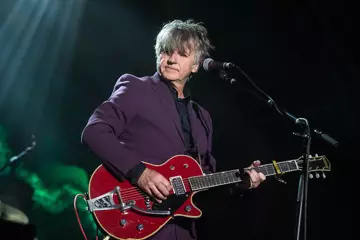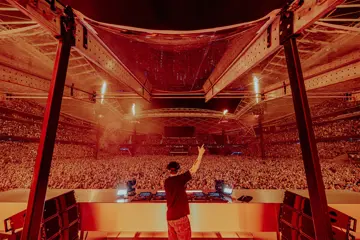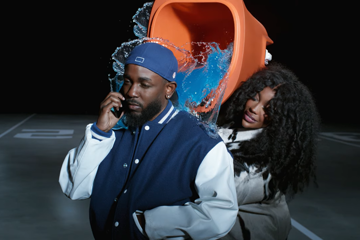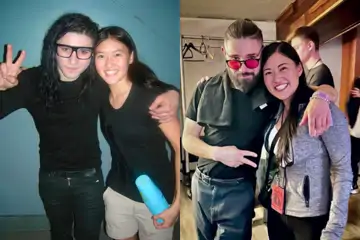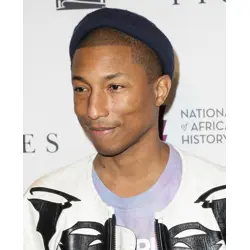 Pharrell Williams
Pharrell WilliamsPharrell Williams is one of those prodigiously talented, extremely prolific and remarkably accomplished people who tend to make the rest of us wonder just what the hell we're doing with our lives. There is, of course, his brilliant career as a producer, both on his own and as one half of The Neptunes – he's worked with everyone from Jay-Z and Beyonce to Justin Timberlake and Britney Spears. As a musician, he's released solo projects and recorded with his band N*E*R*D. He's been nominated for 19 Grammy Awards; he's taken home four of them.
Then there are the sidelines. Williams has co-founded a couple of clothing lines: Billionaire Boys Club and Ice Cream Footwear. He's designed jewellery and furniture. He's created sculpture. He's a creative director for online broadcaster KarmaloopTV. And he's building an after-school centre for kids in his hometown of Virginia Beach. He only sleeps 30 minutes a night. No, that's not true at all... but you thought it could be for a moment, didn't you?
So we've established that Pharrell Williams is kind of omnipresent. But he seems to be even more so lately. Two of the most popular singles of recent times, Robin Thicke's Blurred Lines and Daft Punk's Get Lucky both benefit from the Williams touch. Those pounding drums on Hans Zimmer's Man Of Steel soundtrack? Williams. And who's that providing the score to one of the most popular movies of the year, the animated hit Despicable Me 2? You get one guess.
The first Despicable Me, which saw Steve Carell voicing Gru, a super-villain unexpectedly humanised when he becomes a father figure to a trio of adorable orphans, was Williams' first outing as a soundtrack composer, and his input was regarded as a pivotal part of the movie's massive appeal. “The music for the first film was distinctive and defined the character of the movie,” said Chris Meledandri of Illumination Entertainment, the production company behind the film. “It was borne out of collaboration between Pharrell and Heitor [Pereira, co-composer]. It was clear that was a relationship that we wanted to continue for the second film.”
Don't miss a beat with our FREE daily newsletter
For his part, Williams needed little enticement. “I really wanted to do it,” he says. ”It's animation! And animation was a huge part of my childhood, my formative years. When it comes to my creativity, I attribute it to skateboarding, I attribute it to music and I attribute it to animation. Cartoons raised me. From Looney Tunes to Justice League... I love everything that is on [animation TV station] Boomerang right now. I'm 40 and I watch SpongeBob all the time.”
But enthusiasm isn't always enough, and Williams is smart enough to recognise that he's still in the early stages of his learning curve when it comes to soundtrack composition. “Filmmaking and scoring are really comprehensive jobs that take a lot of years and experience to get to an expertise level,” he says. “Part of it is just reaching into oblivion for things that don't exist. You don't necessarily know where what you get comes from but you know it feels good. Then your job is to continue to chase that. It's like you've got a rock and you chip away at it until you find the sculpture you're looking for.”
He admits, however, that working with filmmakers to provide them with the sonic component of the big picture has similarities to his other collaborative endeavours. “I found myself really aiming to be harmonious with the intentions of the writers and the director,” says Williams. “Aside from the directives they give you, there's the images, the dialogue, the physical movement of the characters. You have to make sure what you're giving the film contours and parallels what the filmmakers want. Because even if you think something is great, if it doesn't fit it can become a distraction. A film is like a rollercoaster ride; it goes the way the designers of the track intend it to go. And one person riding a rollercoaster can't go in another direction – it's not built that way. What I have to do is make sure I'm maintaining that direction. Because I'm there to enhance the ride, not distract from it in any way.”
With Despicable Me 2, Williams says that his discussions with Meledandri and co-directors Chris Renaud and Pierre Coffin resulted in a search for “a more soulful sound – something that was right in the world of the late-'60s/early-'70s”. And he found the process of working with the filmmakers an especially agreeable one.
“My job is to interpret what they want and articulate it through music,” he says. “You either feel that or you don't, and I always felt like I knew where they were coming from. What they do is so vivid and striking it's hard not to be inspired by not only what they give you but also the intentions behind it. And that's good because it means you can approach it from any different direction.”
The main intention when it came to Despicable Me 2, which has Gru putting aside his super-villainous ways, devoting himself to fatherhood and falling for a fetching crime-fighter voiced by Bridesmaids' Kristen Wiig, was conveying a sense of happiness. As well as reprising songs and themes from the original movie, Williams came up three new numbers in this upbeat vein, Fun Fun Fun, the aptly-titled Happy and Just A Cloud Away, the one with which he's most... well, happy.
“I'm very proud of Just a Cloud Away,” he said. “It's meant to be a Hallmark card for people who are going through a tough time. You can never get tired of new iterations of 'It's going to be okay'. I'm happy that in Despicable Me, of all films, we get to make music and give and offer people happiness. The filmmakers chose a happier through-line for the story, and that was perfect for me because that's where I felt the music needed to go anyway, a happier place, where people could be excited and be festive and smile without feeling funny about it.”




